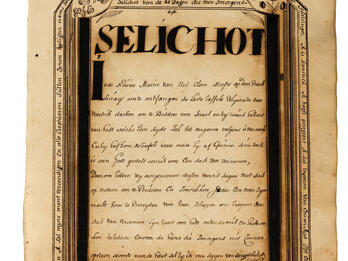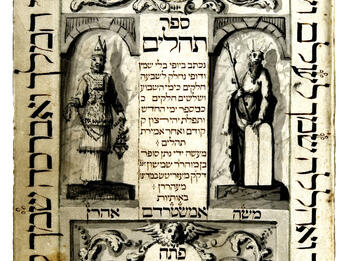Yiddish Translation of the Bible
Should we not cry and weep that until now our scholars have not concerned themselves to provide us with a 24 [i.e., Bible] in Yiddish, arranged according to the simple meaning of the text, word for word from the holy tongue to Yiddish and according to the nature of that language? Not like the Teytsh ḥumash, which is translated word for word from the holy tongue into Yiddish, but he [the translator] thereby forgot to work according to the nature of Yiddish. This is the reason why one does not understand it. Upon my life, innumerable times I have heard them speaking in their wit, almost as though cursing our sages and rabbis, the intelligentsia of our generation: Why can one understand the books of other nations, each one in its language, and in our books can one find no trace of speech? Their language itself is childish, so one can discern the great difference in the same language, like the difference between dark and light.
Thus one can clearly see that our Yiddish writers, in opposition to the scholars of other nations, seem to babble like children who have no knowledge of their language’s nature [ . . . ] and they say: indeed they are truly rabbis and wise and insightful people. Even the wise men of other nations acknowledge that our sages have clear, straight, and true knowledge. And they are also intelligent. So why are we worse than all the nations? Look at our people who live in the land of Italy, who are great experts in the holy tongue. This is all because they have a Bible in clear Judeo-Italian, with the peshat and the derash [interpretations of the verses], and the Spanish Jews: none in the land can compare with their expertise in the holy language, and we can see clearly that they write their books in a pure and refined language according to grammar, and the primary reason is that they learn first and foremost the peshat and that the masses of Spanish Jews have a Bible written in Spanish according to the rules of that language.
And now, this useful thing, without which it is impossible to exist—it is truly like the bread and the food most vital for the soul—is coming into the light of the world: all twenty-four books in their entirety, that is the five books of the Pentateuch, former prophets and latter prophets, and in it the five scrolls, translated word for word from Hebrew into our Yiddish according to the nature of the Yiddish language. Until now there has been no such thing in the world among the Ashkenazim. All the translated books were, until now, mixed with strange legends and midrashim, and the teachers imparted this method to their students, and did not know themselves what is according to the method of the peshat and what is according to the method of the drash, because they also learned in this backwards way. The teacher knows no more than the student, and the student knows only what his rabbi knows [ . . . ], and this defective custom would have persisted; however, today the old damage of the inversion and desecration of God’s name will be corrected and uprooted because the Holy One has had mercy upon us and roused from the east a dawn of righteousness. They will be called to their feet to do such a great deed as this, to print a translation of the twenty-four books in simple and polished Yiddish, in a clear language.
Credits
Published in: The Posen Library of Jewish Culture and Civilization, vol. 5.




